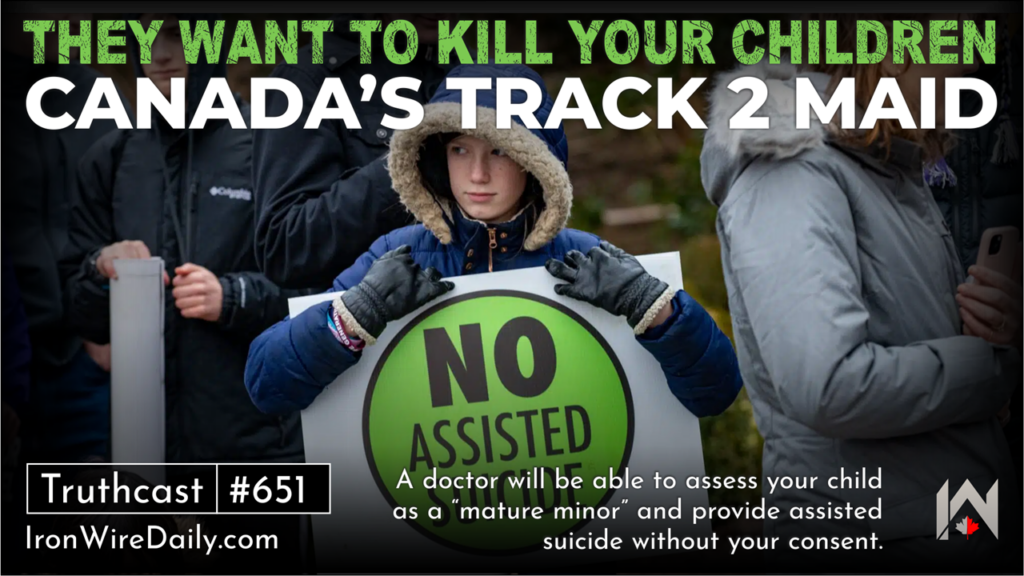Beyond ‘What is a Woman?’
Dr. Miriam Grossman
Dr. Miriam Grossman has been a child psychiatrist for decades. She is a senior fellow at Do No Harm Medicine and a psychiatric consultant for the American College of Pediatricians. Dr. Grossman has testified before Congress on trans issues, appeared…
(0:00 - 4:04) Dr. Miriam Grossman has been a child psychiatrist for decades. She is a senior fellow at Do No Harm Medicine and a psychiatric consultant for the American College of Pediatricians. Dr. Grossman has testified before Congress on trans issues, appeared in the documentary What is a Woman?, and is the author of five books, including her 2023 book Lost in Trans Nation: A Child Psychiatrist's Guide Out of the Madness. As I read Dr. Grossman's book, I realized that after the many interviews I have done on the trans agenda, I had finally found someone who could explain in plain English how our society, and most of all our kids, have been brainwashed with the ridiculous notion that a person can choose their gender. Dr. Grossman reveals the real statistics that paint a grim picture of the societal delusion that especially targets our children, while debunking the completely unsupported claims of the trans movement. Along the way, she gives a clear and compassionate picture inside the heads of the parents who consent to allow their children to be mutilated, but most importantly, a look inside the heads of the kids themselves. By understanding how our children are being brainwashed, you will be far better equipped to protect them and guide them safely through the trans minefield. Dr. Grossman, welcome to the show. It's great to be here, Will. Thanks for having me. And thank you so much for taking the time for this interview and for the excellent book, well, books, actually, that you've written, but today we're focusing on Lost in Trans Nation and you have an excellent perspective on this, far more so, perhaps, than anybody else I have interviewed except possibly, maybe, Jon Uhler, because you are a practicing psychiatrist, have been, I believe, for something, 45 years. Is that correct? Well, I've been in medicine for about that long. Well, more or less, not going to split hairs, but I've been a child psychiatrist for decades and I've been seeing, in particular, kids who are confused about their sex as well as their parents for about five years. That's exclusively what I've been doing for five years. Yes, and I've got some questions about that later, but I want to start by establishing a groundwork because I know from some of the other people who I've interviewed on this topic that a lot of this has really snowballed since roughly 2013. You may have a little bit more information on that than I do. So, you've been practicing for a lot longer than that. So, I wanted to ask you prior to, and I'm not going to put a year on it, never mind the 2013 statement, prior to all of this socially snowballing and becoming this major issue in society, how many kids did you see with what is now called gender dysphoria and what was the treatment for them? Well, I saw zero kids, which is to be expected because until recently it was such a rare condition, you know, one in tens of thousands of kids, many tens of thousands of kids, extremely rare. So, I never saw anybody. I certainly was exposed to the fact that this diagnosis, this condition does exist. I was exposed to that in my training to become a psychiatrist because it was in the DSM, the manual, the diagnostic manual of mental illnesses. (4:05 - 4:59) But I never expected, I mean, none of us, the people that I was training with, we didn't expect to actually see any cases in our entire lifetime because it was so incredibly rare. And just to give you another indication of how rare it was, Will, 20 years ago, let's say in 2005, there were only three clinics that existed where parents could bring their gender dysphoric child, at that time it was called gender identity disorder, in order to get some help and advice with those kids. Now, when I say three clinics, I mean three clinics in the entire world. (5:00 - 5:16) Okay. One in Holland, one in London, and one there in Canada, in Toronto. So, there were just three clinics in the entire world and those clinics didn't have many patients. (5:17 - 6:21) So, yes, it was extremely, extraordinarily rare to have a child and especially a teenager. In other words, childhood onset of gender dysphoria was more common, even though it was extremely uncommon, but still it was more common than adolescent onset of gender dysphoria. And what we have now in the past 10 to 15 years ago is a wave, a tsunami of kids who are developing gender dysphoria as teenagers. Yes. And I've got some statistics here from your book to put that in perspective for the viewers. And as you've just said, and I knew that was going to be your answer, Miriam, when I asked you, how many children did you treat with gender dysphoria or gender identity disorder prior to all of this becoming a major thing? And the answer was none. (6:21 - 7:51) So now, folks, here's some statistics from Miriam's book. The rise in gender clinic patients in London's gender clinic saw an increase from 14 patients per year in its first decade. That's 14 per year, folks. And that's one of only three clinics in the world. To over 3,500 patients in 2021 to 22, with a waiting list exceeding 5,300. The number of teens with recent onset gender dysphoria has reportedly increased by 4,000%. This is insane. Because the picture that it paints to me very clearly, and perhaps I'm a little bit biased because I've done a number of interviews on this topic now, there's no possible way this is some sort of hidden psychological disease that was always there. This is being implanted in our kids. They're being brainwashed. To me, that is the only rational explanation for this. Well, correct. It's due to cultural issues. It's due to the much more widespread acceptance that there are individuals whose identity, their experienced identity is at odds with their biology. And that incongruence, so to speak, is a normal variation in human development. (7:51 - 10:45) These ideas come, as I explain in the book, they evolved over decades in radical circles, feminism, and other places, academia, that latched onto this idea that there's a thing called gender, which is in your mind, and it is separate from sex, which is, as they would say, between the legs. And that when gender and sex do not match, then gender overrides sex. This is what the theory was. And it's interesting that you should bring up the year 2013, as you did a moment ago, because 2013 was the year that psychiatry revised the DSM manual, and they got rid of the diagnosis, gender identity disorder, and they replaced it with the diagnosis, gender dysphoria. And that may seem like a minor revision in nomenclature, but it actually was much, much more than that. Because in doing that, in making that change, which by the way, was not based on any new information or research or consensus among psychiatrists and psychologists, rather, it was based on a small group of people that were pressured politically and motivated by, you could call it compassion for these very, very rare individuals, and wanting to remove the stigma of the condition being called a disorder. So, previous to DSM-5, which came about in 2013, in previous editions, we had the diagnosis, gender identity disorder. And the committee that was charged with making decisions about what to do with that diagnosis in the new edition, the DSM-5, they were not happy with that word disorder. And as I explain in the book, they went through a process of looking at their possibilities of what they could do. (10:45 - 17:30) They did a survey of organizations who, international organizations involved with the welfare and well-being of transgender individuals. And of those 43 organizations that were included in the survey, there were only five that were medical organizations. So, it was a vast majority of organizations that were, you could say, based upon helping those rare individuals who had the diagnosis of gender identity disorder, and they very, very much wanted to remove the designation of disorder. And in fact, almost 50% of the organizations that were surveyed wanted to remove the diagnosis altogether from the DSM, so that this would no longer be considered a psychiatric diagnosis with a number and a code and so on, because that also carried stigma. And the reason why the diagnosis remains in the DSM is essentially because there's a need for a code with which to be reimbursed from insurance for treatment. Okay, so these people need various, not every single one, but many of them do go for mental health treatment as well as medical and surgical interventions. So, without a DSM diagnosis with a code, they would be unable to bill and be covered for all those expenses. So, that was also one of the big motivations for keeping the diagnosis in the DSM, but it just goes to show us how radical these groups were. They wanted, in the same way that homosexuality, and I don't want to get into that, but was removed from the DSM in 1973. So, in the same way, these groups lobbied for the removal of this diagnosis from the DSM, which would mean, if they had been successful, that they were saying that individuals who are so detached and dissociated from their biology, from their bodies, that they actually want to have healthy organs removed, that that does not constitute a psychiatric disorder. Now, I'm glad you brought all of that up, Miriam, because I wanted to also bring in a few more points. Once again, I'm going back and referencing my interview some time ago with Jon Uhler of Unmasking the Trans Movement. The most significant thing that Mr. Uhler showed me was the chart of diagnoses of gender identity disorder, which then became gender dysphoria. And if I'm recalling the chart correctly, and I think I am, prior to about 2005, it was virtually non-existent. And then it starts to creep up a little bit, until you get to 2013, when the DSM-5 new manual is released. Now it's got a new name, now it's got a code, and now doctors can start billing insurance companies for it, and it skyrockets. So the question I have is, how much of this whole agenda is just profit? What I want to say about that committee is as follows. It's not unusual. The American Psychiatric Association, every 15 years or so, comes up with a new edition of the DSM. And so they have these committees. And who's going to want to, they're voluntary. Membership on these committees are voluntary. And who's going to want to be on the committees? If you have a committee about anxiety disorder or OCD or depression, you're going to have those people who have a special interest in that topic. I mean, it only makes sense. These are the people that have an interest in this subject. These are people that have done the research, that see the patients, and so on and so forth. So you're, by definition, the people on the committee are going to be kind of a cherry-picked, it's not going to be just a, you know, a random selection of mental health professionals. It's going to be those mental health professionals that have long had a special interest in this topic. So I want to just explain, you know, gender is complicated. There's nothing, there's almost nothing that's not complicated. And so it's also complicated to try and understand what has led up to this skyrocketing of cases. And I believe that the American Psychiatric Association's decision with the DSM to normalize this condition, calling it gender dysphoria, gender dysphoria, meaning unhappiness or discomfort with being male or female. And the focus in the new definition in the DSM-5 was not that people had this disorder of being alienated from their physical reality. No, that was not the focus of treatment. The focus of treatment was the feelings of unhappiness and anxiety and discomfort with the mismatch. So in other words, not the mismatch itself is the focus of treatment. (17:30 - 20:22) So you're no longer sitting down with people and saying, well, let's look at this. What is this feeling of discordance all about? Where did it come from? How can I help you understand this and help you come to a point perhaps of accepting your physical reality? That was no longer going to be the focus. The focus was going to be the dysphoria and minimizing that dysphoria so that people could live with the dissociation, with the incongruence, so to speak. And their dysphoria, we're going to find ways to help them be less dysphoric either through interventions like social transition, medical transition. No one, of course, can transition between male or female, female and male, but this is the language that's been imposed on us. So you see, this was a very huge thing that the American Psychiatric Association did. It was a total shift in thinking about this condition. Now, this is not the only thing, obviously, that led to this skyrocketing. I will also point out that it was around this time that social media became a big thing. So during those years, we started with YouTube and Instagram and all the various, TikTok came in after that. And so that kids had this way of connecting with all sorts of random people that they would never have had the means to meet and to converse with and to listen to prior. Yes, and I wanted to ask you about that. That's very much something that I've been wanting to ask you is, and I've raised two children myself, they're now young adults, and I certainly watched them go through this obsession with social media. So what we've got now, and I'm sorry, I have to give more context to this question. Not long ago, I interviewed detransitioners Kellie-Lynn Pirie and Faith Groleau, and they both told me the same thing. They said they ended up transitioning because they were having psychological, emotional issues. They went for counseling, they went for therapy, but they didn't get therapy. What they got was a prescription for puberty blockers and a referral to a surgeon. (20:22 - 22:04) And the conclusion that both of them came to in that interview was that, at least, I don't know about the U.S., but here in Canada, proper psychiatric care has been replaced by gender treatments. You know, if you're not feeling like you fit in, if you're not happy, well, you know, here's your prescription, and here's your referral to the surgeon, and you'll be fine. And, of course, both of these ladies found out which no, they were not fine, and they deeply regret the steps that they took. And I know you've talked to a lot of people like that. So where I'm, we had to give all of that background to ask this question, and I very much wanted to ask you, as a practicing psychiatrist who has worked with these people, our youth, who today are in this social media echo chamber, where they're talking to their peers, but they're not talking to adults, they're not talking to people who have life experience, they're not talking to people possibly who even care about what happens to them, psychologically speaking, and then from that socially, what is the effect of that social media echo chamber on our youth? Okay, well, I'll just take one moment to correct you, because when they're on social media and other places as well, chat, chat groups, and so on, it's not only their peers. Unfortunately, there are a lot of adults hanging out in those places, and they then groom them. Yes. In this direction. So it's not only their peers. Thank you for raising that point. Yes. Yeah. Now, let's see. Let me first address the issue of psychiatry and what's happened in mental health. So when I say, I mean, psychiatry, psychology, social work, counseling. (22:04 - 23:40) Okay, so what's happened is that the whole thing, all these mainstream organizations, professional organizations, were captured some time ago, were captured by both internal and external activists, radical activists, that were very aggressive and very loud. And what happened was, and this was already quite a while ago, that they, in a way that was not preceded by any debate or discussion or consensus, they just came in and said, this is how we're going to do things. Kids who have gender dysphoria, well, anybody, not just kids who has gender dysphoria, they must be affirmed. So regardless of the age of the person, regardless of whatever mental health conditions they may have, they must be automatically affirmed. Their identities must be rubber stamped, no matter how bizarre their identities might be. So you have a kid that comes into the office who's clearly, let's say, on the autism spectrum and having all sorts of social issues and neurocognitive issues. (23:41 - 24:09) And this child says, I'm non-binary, meaning I'm neither male or female. So the professional organizations tell people like myself, who were out there doing the work in our offices, that we must immediately accept that and just ask the child, okay, what does that mean to you? I want to understand it. What name do you want me to use? What pronouns, et cetera, et cetera. (24:10 - 24:51) And you just get behind the child a hundred percent. You put the child basically in the driver's seat. And this is called gender affirming, gender affirming care, even though what we are affirming is actually a delusion. So my profession, instead of treating delusions, is promoting them and celebrating them. And that's what has happened in mental health. And that's one of the reasons that I've written so many books about how my profession, very sadly has lost its way. (24:52 - 26:37) And too many of my colleagues either have been brainwashed along the way, or they don't want to deal with it. And they just say, oh, that stuff is crazy. I don't see those kids. I send those kids to gender specialists, or they're sitting quietly. I mean, there are exceptions. I don't mean to say there are no exceptions, but the exceptions are very few and far between. They're just sitting quietly and they're angry and they're outraged, but they don't want to lose their jobs so they don't speak up. So we have a situation where, first of all, we've got this persistent agenda that kids are being exposed to. And of course, in my experience, at least every child goes through a period at some point in their childhood where they feel like they don't fit in. And so they go, rather than talking to a parent or hopefully finding a teacher who has their head screwed on right, they go on to social media where, yes, it's peers, sometimes it's predators grooming them. And they get this message that says, well, if you just transition, everything will be fine. And that injects them into a mental health care profession that has been told to affirm what is clearly lunacy. And I mean, I haven't got an ounce of training in psychiatry, but it seems to me that a boy claiming to be a girl is about the same thing as me walking into a psychiatrist's office and claiming to be an elephant. Well, I am clearly not an elephant. And I would hope that there isn't a psychiatrist in the world who would then turn around and try to affirm for me that I am an elephant. Well, there might be. Well, I don't know how that's not help, Miriam. That's the opposite of help. (26:39 - 28:36) Things are pretty crazy out there. I mean, you know, we have furries identifying as animals. So elephants don't have any fur, but, you know, maybe give it a few years. Give it a few years. Yeah, things are very bad. I mean, I'm laughing about it, but that's because I've, you know, I've been in this for so long that if you can't occasionally laugh about it, you know, you're just finished. You know, I do want to respond to one thing that you said. I do want to, you know, I mean, there is, there do exist very, very extraordinarily rare individuals who from a young age, from as soon as they can speak practically, insist that they are or they want to be the opposite sex. Now, this is a psychiatric disorder. I want to remind your audience that the people that we're speaking about today are a 100% physically healthy. They don't have any, you know, congenital chromosomal abnormality. They don't have ambiguous genitalia, which is also a rare disorder in which a child due to, there's a great many possibilities that can cause this chromosomal issues or endocrine disorder, you know, might have genitalia that are not clearly male or female. And the people who, you know, the activists who are pushing this transgender ideology on all of us, use the fact that those people exist, those it's used to be called intersex, but now called disorders of sexual development. They use the fact that those people exist to say, well, there's a spectrum. You know, there isn't a lot of people are not clearly male or female. (28:37 - 29:14) Sex is actually on a spectrum and that's a whole other discussion. But I do want to emphasize apart from all these people, you know, who have medical abnormalities that these individuals that we're talking about who have gender dysphoria are 100% healthy. And before they get on to this path of medicalization, they have healthy breasts, they have healthy reproductive systems. (29:14 - 29:50) And it's only once they get on the path and begin being treated with blockers and cross-sex hormones and surgeries that they then have a disorder, you know, a medical disorder. They then become infertile, sterilized, and have a whole slew of medical problems due to those treatments. Before we move on to talking about the parents, and I do have a question about them, I want to ask you one more question about the youth that are being subsumed by this narrative. (29:50 - 33:06) And I first found out about the connection between the trans agenda and autism spectrum disorder from Dr. Peter McCullough about a year ago. But of course, Dr. McCullough is not a psychiatrist. Why are autistic kids more susceptible to this message? Okay, well, there's actually a lot of reasons. I'll just give you some of the top few. One of them would be that kids on the spectrum typically have social impairment. They have trouble, you know, fitting in with their peers, especially the girls. You know, girls and boys are different. And girls do a lot of socializing and sharing of feelings and just talking a lot and, you know, getting emotionally close to one another. And a girl who's on the spectrum might have tremendous difficulty with that. Part of autism is being socially impaired, having trouble identifying your emotions, having trouble identifying how other people are feeling, having trouble picking up on social cues, facial cues, what people mean when they say things, when they joke around, when they're sarcastic. These are all really hard for kids who are on the spectrum. And as you move into middle school and certainly high school, the most important thing in your life becomes fitting in and finding a group of kids that's your group. Okay, who you're hanging out with, who you're sitting with, you know, at lunchtime, who you're talking to during recess. This becomes very, very important. And those kids who have autism have a tremendous difficulty with that. It causes a lot of pain for them. And then, so the idea of becoming LGBT is seen as a solution because you are automatically accepted and celebrated and, you know, given high fives by everyone at school, not only the kids, but the staff. So when an autistic kid can go from just, you know, being ignored and possibly bullied, a lot of kids are bullied because of the features of their autism. You know, they can be very quirky and different. So they can be bullied for that. So the idea for them of making, you know, having a new identity, it will get them a lot of points socially. That's one reason why autistic kids are attracted to this. But there's other reasons as well. For example, kids who are on the spectrum tend to have what we call black and white thinking. (33:07 - 33:34) Black and white thinking is when there's either or, and there's no gray in between. So if you're, for example, your teacher doesn't like your project and she is critical of it, you know, the autistic child might come home and say, my teacher hates me. She always hated me. (33:34 - 34:45) And sure, you know, she is going to forever hate me. Why? Because today she didn't, you know, she didn't give me a good mark on my project. So there's an inability to say, well, hold on just a minute. This teacher's actually always been very supportive and very kind to me. And it's just today that things didn't go so well. Being able to see that there's gray, there isn't just, she loves me or she hates me. Now, how does that translate into gender dysphoria? Well, for example, take a girl who is entering puberty and she's unhappy with the attention that she gets from boys because they're looking at her differently. And she's unhappy with the idea that she may get her period or she already has started getting her period and she, you know, she has cramps and other physical symptoms that come along with menstruation and she doesn't like those feelings. Well, in addition, these kids, you know, often have sensory issues. (34:46 - 37:18) So the experience of puberty is extra difficult for them. So in her black and white thinking, she might, she might conclude, well, I don't like all this girl stuff that I'm going through. I must be a boy. Well, Miriam, thank you very much for that explanation, because while you were saying that you really clarified something for me, and I've been giving this a lot of thought, obviously I've interviewed quite a number of experts on this, but something just gelled as you were talking about that. What we're seeing here is, and I made reference to this earlier, personally, in my experience, you have to go an awful long way to find a kid who does not, at some point in their youth, feel like they don't fit in. So when that happens, now our society has a kit for that. All you have to do is pick a label, non-binary, transgender, whichever, we've got lots of them, and you automatically become part of this club. Right. You become part, not only of a club, but it's a club of marginalized, disenfranchised, oppressed individuals. And you get a lot of points for that, especially if you happen to be a white middle-class heterosexual person, and I discuss this in the book as well, that you get a lot of points by becoming part of a group. Instead of being the oppressor, you are one of the oppressed. Right. Now, I want to move on to the parents. It was so striking, for me at least, reading your book, because you start off with a very long list of parents from around the world who you have helped. Well, not just parents, but people, a lot of them are parents. But what struck me was when you started talking about, a lot of these people are having conversations from their cars, bathrooms, closets, garages. They don't want to be heard having this conversation, and I have to confess, I'm baffled as to why. Okay. Yes, I dedicated my book to the parents of transgender-identified kids who are some of the greatest heroes and heroines that you will ever meet. I have an entire chapter about them called Mourning the Living. I dedicated my book to them, 500 parents from 17 countries, I think it was. (37:19 - 40:24) Now, you're asking me, why do some of them, when they speak to me, they're in their bathrooms, and their cars, and their basements. Well, typically, it's because they don't want another family member, either the transgender-identified child or his or her siblings. But sometimes, it could be a spouse as well, overhearing the conversation that they're having with me. This is actually very, very common. I've had so many conversations from cars, you can't even imagine. Then, if I'm understanding correctly, their fear of being overheard is not fear of what they're talking about. It's fear that if somebody overhears them, it might make the situation worse. Correct. If someone from the family overhears them and realizes that they are not going with the program, to the contrary, they've sought out someone like myself that's going to push back against the child's new identity. When I say push back, and anyone who reads my book will understand this, I don't mean what I want is for parents to be loving and supportive of the child and what the child is going through without supporting the false belief of the child. You can very much do that. Many, many parents are able to do that. While you are standing next to your child while they're going through this, and you are trying to get as much information as you can and help them as much as you can, you will not cross the red line of denying reality. You can explain that to your child. I offer in the book a model conversation of a parent with a child who has come to them and announced a new identity. How do you handle that? How do you handle that conversation? It's very important to know beforehand, before it happens. My book is for regular moms and dads to help them avoid this conversation from ever happening. But if it does happen, to be prepared for it. You can be. You can definitely be prepared for that bombshell. Wait, did I answer your question? What did you ask? Yes, you did. Yes, you did. It leads to another one then. You've worked very hard, obviously, to help as many people as you can, but there's only one of you. (40:24 - 45:00) Hopefully, we're going to have some parents watching this, parents whose children may be approaching that point in their lives. My own son, he didn't go into the trans narrative so much, but he did join the woke crowd. Looking back on it now, my wife and I can see that there were certain warning signs, but we didn't know what they were then. For the parents who are watching, whose kids may be coming up on this point in their lives, what are the warning signs they should be watching for so that they can address this before, as you say, before it gets to that point where it's a crisis? Okay. Well, prior to any warning signs, I would just encourage parents that you have to give your kids from an early age, if possible, some sort of structure from which they will understand that they have purpose and meaning in their lives, whether that's going to be religion or something else. If you don't give your children a framework for understanding that their existence has value and their lives, they need to have a mission, a higher goal than just earning a living, getting a lot of followers on social media, having a lot of pleasure and fun in your life. You need to provide that to your kids because if you don't, I promise you, there are countless people and organizations that are just waiting to sweep in and recruit your child into their belief system of what a meaningful life is, of what you should be fighting for in your life and devoting your life to. If you don't do that, it leaves a void and your child becomes particularly vulnerable to all these social movements that are out there. For sure, one warning sign, but it would already be late in the game in many cases, is if your child comes to you and says, especially a young child, like 9, 11, even I would say early high school, and they say, I think that I'm GLBT. I just haven't, I don't know which one. I had one family in which the girl said in sixth grade, I know that I am GLBT. I just don't know which letter. So yes, could your child possibly be experiencing same-sex attraction? Of course, but I don't give that much validity until later in adolescence. If your middle school kid is already thinking about these things, which they're going to be if they attend regular schools and get sex education, so-called comprehensive sexuality education, which is another subject I've written a book about, that indoctrinates kids with these ideas about GLBT topics and exposes them at a very, very inappropriately young age to these topics. So yeah, one warning signal, and not just the GLBT, but the general, you know, the quote unquote, the woke positions about any number of things. And in Canada, I mean, my gosh, you're right. I mean, you do have more of an issue with that than we do, which is saying a lot. So if your kid's coming home and spouting off these viewpoints and that he or she obviously got somewhere else, did not get it from you, you want to start exploring that. (45:01 - 45:18) You want to start asking questions. You know, I'm wondering, where did you hear that? And you know, suggesting that, you know, you've got to be a critical thinker. Not everything that you hear at school or online is necessarily going to be true. (45:18 - 45:52) Right. Now Miriam, we have 10 minutes left before you have to go. I have two more questions I would like to ask. And I have to give a little bit of preamble to this next one, because as a journalist, when I'm reading a book, preparing for an interview, I'm thinking about what do my viewers want answers to? But every once in a while, I run across something that hits me viscerally. And this is one of those questions. I am, as I've already said, the parent of two kids myself. (45:52 - 46:10) They're now young adults. And one of them went through a very difficult time and still is. But I have to say, if anybody had ever suggested to me that the solution was to medically mutilate them, I probably would have been up on assault charges. (46:11 - 47:03) I simply cannot understand what is going through the heads of parents who allow their children to be mutilated. Could you please explain what they're thinking? Yeah. In my opinion, the vast majority of them have been emotionally blackmailed by professionals who tell them, do you want a live son or a dead daughter? These parents are told as a matter of fact, it's presented to them as if it is a fact, which it is by no means that, that without medical interventions, your child might very well commit suicide. (47:03 - 54:25) And so these parents are stuck and they feel that if this is what the professionals with all the diplomas on their walls are telling me, and this is what the American Academy of Pediatrics, the American Psychiatric Association, and on and on and on, they all have this on their websites. I mean, I'm going to save my child's life. Now, are there a certain percentage of parents who have their own version of mental illness and they're looking to get points in their community, in the world for having a transgender child and supporting them and doing all they can to facilitate their quote unquote transition. Yeah, there are mentally ill parents. There are plenty of mentally ill parents as well. But I think, I mean, there's no studies, but I've talked to so many parents who have been told at gender clinics, you really, you know, this is your choice, a dead child or a transition child. And PS, there is no evidence showing that the suicide rate of kids decreases or adults decreases after the medical interventions. So I'm going to second the last question because I'm going to ask for an open-ended one right at the end. But as a conservative Canadian myself, I can tell you that there are many, many conservative Canadians who really celebrated when Donald Trump was reelected. And he's already done quite a number of things that we are just looking back, sitting back here as Canadians going, oh, we need that in Canada so badly. One of the things that he's done was January 28th, he signed an executive order banning trans treatments and surgeries for anyone under the age of 19. Now, when I went and did my research on this, I discovered that there were already 26 states that had done these bans. So that's about half of the U.S. right there, already on board with we need to protect our kids and shut down this false damaging narrative. So after all of these years that we've gone through of this progression, of this becoming part of our society and being accepted as normal, does this give you hope that people are finally starting to wake up and understand just how damaging to our children this narrative is? Oh, yes, absolutely. We are winning this war, at least in this country. Even a year ago, I couldn't have imagined how many accomplishments and successes we've had. And now that we have the Trump White House, I'm very optimistic. But I do want to say this, it's not enough to just ban the medical interventions for minors. It's a good start, but it's not enough. We have to go to and, you know, and ban the sex education and other organizations that are coming in with and introducing these ideas, these dangerous and false ideas such as gender, gender identity, transitioning, so on and so forth, to kids at a very young age. And I'm trying very much, and I think that I will succeed in getting the attention of the White House and Health and Human Services, which is now going to be headed by Bobby Kennedy, who is, of course, extremely wary of the of medical, mainstream medical organizations, and tell them that, you know, there's much, much more than just the medical and surgical interventions. There are poisonous ideas that we are force feeding our children with, poisonous ideas. There are books that are being read to children, preschool children, who might be, I don't know, two, three years old, that say things like, when you were born, the adults in the room made a guess about whether you were a boy or a girl, that guess may have been right, or it may have been wrong, only you know if you're a boy or a girl. So this is a poisonous idea. And we need to not only be looking at the poisons that are in vaccines and the poisons that are in our food, but also the poisonous ideas that we are injecting into our children. Wow. Very well said, Miriam. So I did say I was going to have one last open-ended question for you. Yeah. I really hope that we are going to have a lot of parents watch this interview and hopefully gain from it some knowledge they need to protect their kids. And there's a lot of us, of course, who are very concerned, not just about our own children, about everyone's children. What would be your final thoughts for those people who are worried about our kids and their future? You know, get educated. Just get educated. That is the best tool to prevent this from happening in your family. And it is the best tool so that you can influence and educate the people around you. So, you know, I'm just going to show you my book. Whoops. Can you see it? Yes. And there will be a link to the book on both amazon.ca and amazon.com directly beneath this interview, folks. Okay. And again, it is not, you don't need a PhD to read my book. It is written and I got, by the way, a foreword by Jordan Peterson, which I very, very much appreciated that he was willing to do that for me. It's a book for regular moms and dads. It's very practical. I mean, it has history in it and it has some other stuff, but basically it's a very practical guide for how to avoid this atom bomb from hitting your family. So, oh, I also want to say that if you're not someone that wants to sit down and read a book, there's an audio version, which I did the narration for it. People love it because I got very emotional or impassioned while I was reading it. So you can, you can listen to it instead of reading it. And then there's a ton of stuff on my website as well. A lot of interviews, my testimony in Congress, and you will get educated so that you will be able to, you know, to present a valid argument for why you're not going with this whole, with the pronouns and the change of names. And, you know, you will understand why the basis for the edifice upon which this whole thing is built is faulty. (54:26 - 54:48) And that is why it is, and we're watching this in front of our eyes, that edifice is, is coming down. Miriam, thank you so much for your time today. Thank you for your excellent book and for all the hard work you've put in to help people with this. You're so welcome, Will, and thank you for having me on. And thank you for asking such excellent questions.













